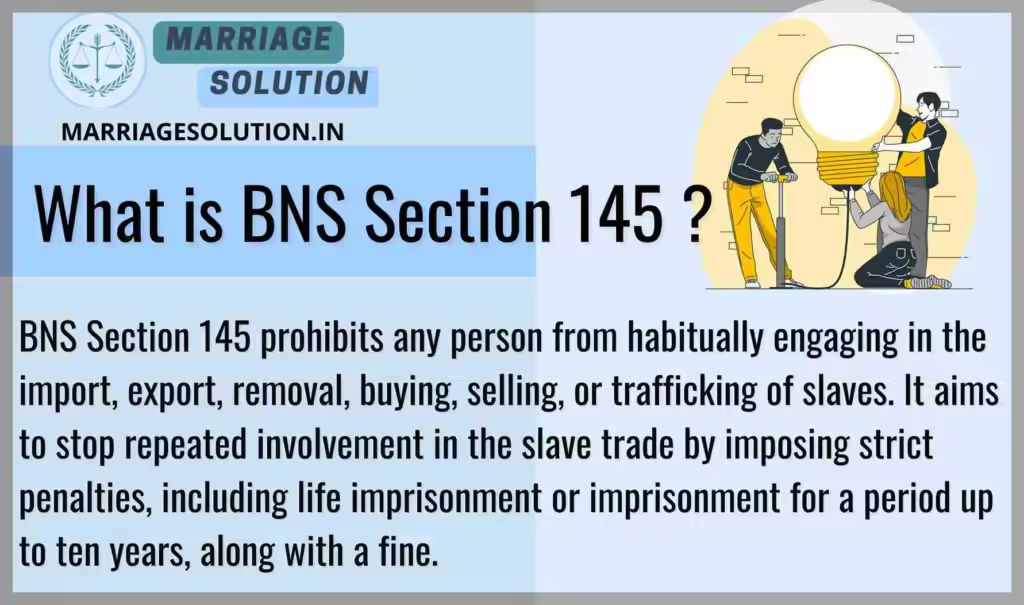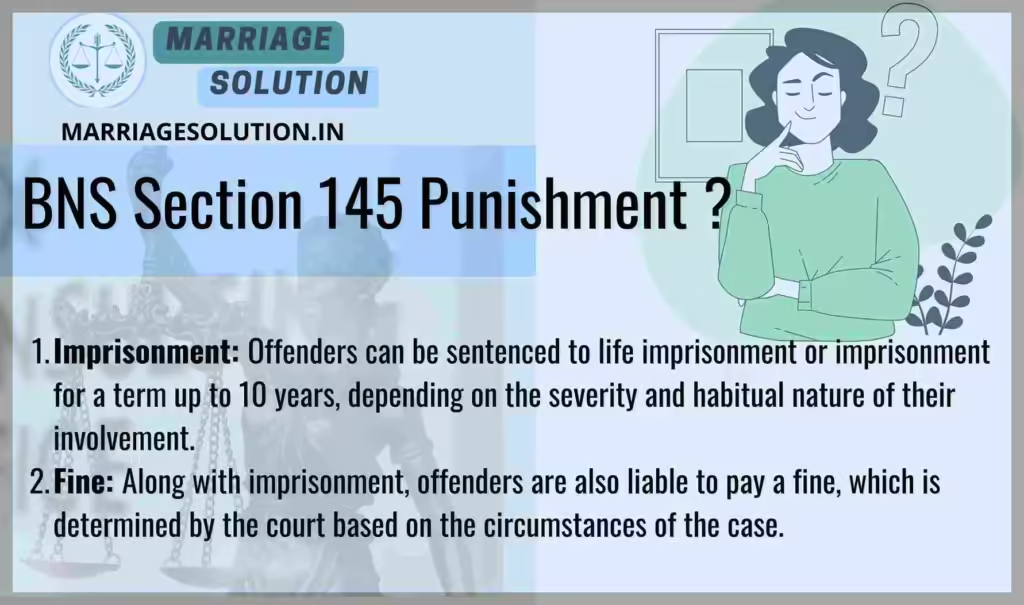Introduction of Section BNS 145
BNS 145 of the Bharatiya Nyaya Sanhita (BNS) deals with the crime of habitual dealing in slaves, one of the gravest violations of human rights. This section criminalizes repeated involvement in slavery-related activities, including importing, exporting, buying, selling, or trafficking human beings. Unlike isolated cases of trafficking, Section 145 specifically targets those who habitually engage in slave trade, treating it as a heinous and organized criminal activity. To deter such practices, the law prescribes life imprisonment or imprisonment up to 10 years, along with fines. By introducing strict provisions, this section emphasizes India’s commitment to eradicating modern slavery and protecting human dignity.
The Bharatiya Nyaya Sanhita (BNS) Section 145 replaces the old Indian Penal Code (IPC) Section 371.
What is BNS Section 145 ?
BNS Section 145 prohibits any person from habitually engaging in the import, export, removal, buying, selling, or trafficking of slaves. It aims to stop repeated involvement in the slave trade by imposing strict penalties, including life imprisonment or imprisonment for a period up to ten years, along with a fine.

Under Section 145 of the bns act 2023
(1) Whoever, habitually imports, exports, removes, buys, sells, traffics, or deals in slaves, shall be punished with imprisonment for life, or with rigorous imprisonment for a term which may extend to ten years, and shall also be liable to a fine.
Explanation of Section 145
Section 145 punishes those who are habitually involved in slavery-related activities — such as buying, selling, importing, exporting, trafficking, or otherwise dealing in slaves.
- If a person is engaged in repeated acts of slave trading, this section applies.
- It specifically targets organized or habitual offenders, not just one-time acts.
- The punishment is very severe: life imprisonment, or up to 10 years of rigorous imprisonment plus fine.
- The law recognizes slavery as a grave violation of human rights and provides strong deterrence.
- The offense is cognizable, non-bailable, and non-compoundable, meaning:
- Police can arrest without a warrant.
- Bail is very difficult.
- The case cannot be privately settled.
- Trial is by Court of Session, ensuring higher judicial scrutiny.
Key Elements of Section 145
- Habitual Involvement → Targets repeated or organized slave trading.
- Covers All Dealings → Import, export, buying, selling, trafficking.
- Grave Punishment → Life imprisonment or up to 10 years rigorous imprisonment + fine.
- Cognizable & Non-Bailable → Strict enforcement by police and courts.
- Non-Compoundable → Cannot be withdrawn or settled privately.
- Court of Session Trial → Due to seriousness, handled by higher courts.
- Human Rights Protection → Links with international anti-slavery norms.
Examples of BNS Section 145
Example 1 (Slave Trafficking Network):
A gang regularly smuggles people across borders and sells them into bonded labor.
They can be punished under Section 145 with life imprisonment.
Example 2 (Habitual Trader):
A person runs an underground network buying and selling individuals for forced labor in factories.
Repeated dealings make him liable under Section 145 → life imprisonment or 10 years + fine.
Why Section 145 is Important
- Protects Human Dignity → Slavery is treated as one of the worst crimes.
- Focus on Habitual Offenders → Dismantles organized crime groups.
- Stronger Than IPC → While IPC 371 existed, BNS 145 adds clarity and aligns with international standards.
- Acts as Deterrent → Harsh punishments discourage anyone from engaging in such activities.
- Supports Human Rights → Strengthens India’s commitment against slavery and trafficking.
Section 145 BNS Overview
BNS Section 145 is designed to address the heinous crime of habitual dealing in slaves, ensuring that those involved in repeated violations of human dignity face severe legal consequences. By targeting individuals and organizations involved in activities like buying, selling, and trafficking human beings, the law aims to eradicate these practices and uphold the fundamental rights of all individuals. The punishments are intentionally strict to serve as both a penalty and a deterrent.
BNS Section 145: Habitual Dealing in Slaves – 10 Key Points
- Habitual Involvement
BNS Section 145 specifically targets individuals who are habitually involved in dealing with slaves. “Habitual” means that the person is not just engaging in a single act of trafficking or dealing with slaves but is consistently involved in such activities over a period of time. This repeated nature of the offense makes it particularly serious under this section. - Broad Scope of Activities
The section covers a wide range of activities including the import, export, removal, buying, selling, and trafficking of slaves. This ensures that any form of involvement in the slave trade, no matter the role, is punishable. For example, someone who arranges the transport of slaves is just as guilty as someone who sells them. - Severe Punishments
The law imposes life imprisonment or imprisonment for up to 10 years depending on the severity of the crime and the offender’s role. This heavy penalty reflects the gravity of the offense, recognizing slavery as one of the most severe violations of human rights. - Inclusion of Fine
Along with imprisonment, offenders are also subject to a monetary fine, which adds an additional layer of punishment. The fine serves to not only penalize the individual but also act as a financial deterrent to future involvement in such activities. - Non-Bailable Offense
Since the offense is non-bailable, it is difficult for the accused to obtain bail while awaiting trial. This ensures that individuals accused of such serious crimes remain in custody to prevent them from continuing their illegal activities or fleeing justice. - Cognizable Offense
Being a cognizable offense means that the police have the authority to arrest the accused without a warrant. This gives law enforcement agencies the power to act swiftly to detain habitual traffickers and prevent further harm to potential victims. - Non-Compoundable
The offense is non-compoundable, meaning that it cannot be settled outside of court. The severity of the crime makes it necessary for the legal system to handle it, ensuring that justice is served through a formal trial process. - Focus on Human Rights
BNS Section 145 is framed around the protection of human dignity and freedom. Slavery is one of the most fundamental violations of human rights, and this section emphasizes the importance of eradicating such practices, acknowledging the inherent value of every human being. - International Implications
While the section is part of Indian law, its implications are broader. As human trafficking and slavery are international issues, this law plays a role in India’s compliance with international treaties and agreements aimed at combatting slavery, such as the United Nations protocols against trafficking. - Court of Session
Cases involving habitual dealing in slaves are tried by the Court of Session, a higher-level court equipped to handle serious criminal offenses. This ensures that the trial is conducted in a court with appropriate authority and expertise to handle such complex and grave matters.
Examples
- Example 1:
A man has been caught repeatedly selling trafficked individuals to foreign buyers over several years. He is involved in removing and exporting slaves to various countries. Despite having been caught once, he continues these activities. Under BNS Section 145, he faces life imprisonment for his habitual involvement in trafficking human beings. - Example 2:
A criminal organization is found to be buying and selling children for labor and prostitution. They have been doing this for years, transporting them across state and international borders. The organization’s leaders, who orchestrate the operations, can be charged under BNS Section 145 and sentenced to up to 10 years in prison, along with heavy fines for their involvement in the habitual dealing of slaves.
BNS 145 Punishment
Imprisonment: Offenders can be sentenced to life imprisonment or imprisonment for a term up to 10 years, depending on the severity and habitual nature of their involvement.
Fine: Along with imprisonment, offenders are also liable to pay a fine, which is determined by the court based on the circumstances of the case.

BNS 145 bailable or not ?
BNS Section 145 is a non-bailable offense. This means that the accused does not have the automatic right to bail and will have to convince the court of special circumstances to be released on bail.
Comparison Table – BNS Section 145 vs IPC (Old Provision: IPC Section 371)
| Aspect | BNS Section 145 | IPC Section 371 (Old Law) |
|---|---|---|
| Scope | Habitual dealing in slaves (import, export, buy, sell, traffic) | Habitual dealing in slaves (import, export, buy, sell, traffic) |
| Focus | Specifically targets habitual involvement (repeated acts) | Similar focus but less clearly defined on habitual involvement |
| Punishment | Life imprisonment or up to 10 years + fine | Life imprisonment or up to 10 years + fine |
| Bailability | Non-bailable | Non-bailable |
| Cognizability | Cognizable (police can arrest without warrant) | Cognizable |
| Compoundability | Non-compoundable | Non-compoundable |
| Trial Court | Court of Session | Court of Session |
| Human Rights Emphasis | Stronger link to international anti-slavery norms | Focused only on penalizing slavery without broader rights language |
BNS Section 145 FAQs
What does BNS Section 145 deal with?
BNS Section 145 focuses on the habitual dealing in slaves, penalizing those who repeatedly engage in the trade of slaves.
What is the punishment under BNS Section 145?
The punishment includes life imprisonment or imprisonment for up to 10 years, along with a fine.
Is this offense bailable?
No, this is a non-bailable offense, meaning the accused cannot easily secure bail.
Is the offense cognizable?
Yes, this offense is cognizable, meaning the police can arrest the offender without a warrant.
What types of activities are covered under BNS Section 145?
Activities like importing, exporting, buying, selling, and trafficking in slaves are covered under this section.
Which court handles cases under BNS Section 145?
Cases under this section are tried by the Court of Session, a higher-level court.
Conclusion
BNS Section 145 is a critical safeguard against systematic and repeated human exploitation. By penalizing habitual slave dealers with life imprisonment, the law ensures that such individuals or networks face maximum accountability. The section’s focus on habitual behavior distinguishes it from other provisions, targeting large-scale operations and criminal syndicates. It also strengthens India’s compliance with international conventions against slavery and trafficking. In essence, this section reinforces the principle that freedom and dignity are non-negotiable human rights, and those who repeatedly violate them deserve the harshest punishments.
Need Legal Support?
If you’re facing court proceedings, marriage-related issues, or any legal matter, our team at Marriage Solution – Lawyer Help is ready to guide you. Just complete our easy online enquiry form, and we’ll connect you with the right legal assistance tailored to your needs.
Finished with BNS 145 ? Continue exploring the next provisions of the Bharatiya Nyaya Sanhita (BNS), 2023. Each section includes explanations, examples, and plain-language breakdowns for easy understanding.
- BNS 146 : Unlawful compulsory labour.
- https://marriagesolution.in/bns_section/bns-146/
- 147 BNS : Waging, or attempting to wage war, or abetting waging of war, against the Government of India.
- https://marriagesolution.in/bns_section/147-bns/
- BNS Section 148 : Conspiracy to commit offences punishable by section 147.
- https://marriagesolution.in/bns_section/bns-section-148/
- 149 BNS : Collecting arms, etc., with intention of waging war against the Government of India.
- https://marriagesolution.in/bns_section/149-bns/
- Section 150 BNS : Concealing with intent to facilitate design to wage war.
- https://marriagesolution.in/bns_section/section-150-bns/
Full IPC Section List: https://marriagesolution.in/ipc-section-list
All Indian Law & Blogs: https://marriagesolution.in/indian-law/
Full BNSS Section List: https://marriagesolution.in/bnss_section-list
